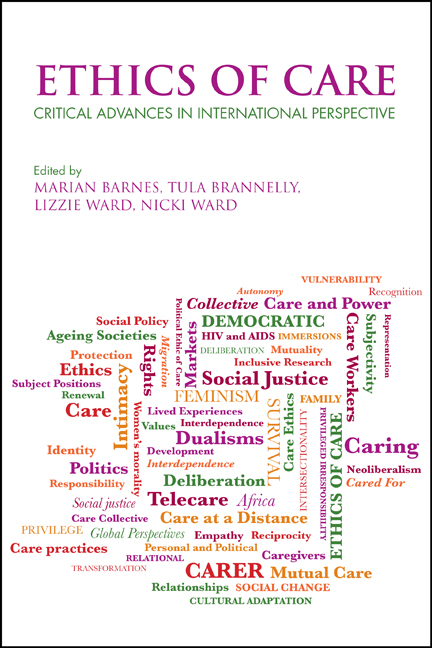One - Introduction: the critical significance of care
Published online by Cambridge University Press: 08 March 2022
Summary
In the 22 years since Joan Tronto's ground-breaking work Moral Boundaries (Tronto, 1993), arguments for a political ethic of care have spread far and wide – both literally in a geographical sense and in the many different contexts in which its core ideas have been taken up. Central to the development of a distinctive ethical perspective built around the significance of care in all our lives is the understanding that humans are relational beings. We do not start out as autonomous individuals who have to seek to make relationships with others. Rather, our survival from birth is dependent on the care we receive from others. Our development requires others to nurture this and throughout our lives we need relationships with others as a basis on which we can grow, learn and experience well-being. Our identity is generated substantially through how others see and respond to us, rather than emerging solely from within ourselves. Most of us seek someone or some people with whom we can share our lives. And for all of us there are times when illness or emotional or physical frailty mean that we need the care, help and support of others to enable us to deal with everyday life. For some people and at some stages of life the need for regular, intimate and skilled care is a necessity for effective functioning and even survival.
Care ethics is based in this relational ontology. From its early articulation by Gilligan (1982) as a different way of thinking about right judgements from those deriving from justice ethics, through a ‘feminine’ perspective on ethics and moral education (Noddings, 1984) to the explicitly ‘feminist’ and political work inspired by Moral Boundaries, the ethics of care has countered an ethical perspective that starts from abstract moral reasoning and that assumes that we start out as disconnected individuals who then have to seek to form relationships. This is the basis for its attraction to those working in the social sciences, including those working in applied spheres such as social work and nursing, as well as to moral philosophers who recognise the importance of grounding moral theory within real lives.
- Type
- Chapter
- Information
- Ethics of CareCritical Advances in International Perspective, pp. 3 - 20Publisher: Bristol University PressPrint publication year: 2015
- 1
- Cited by

